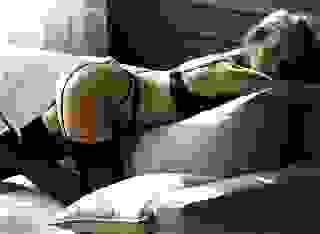- Romance
- Catch & Release: Kristi
Note: You can change font size, font face, and turn on dark mode by clicking the "A" icon tab in the Story Info Box.
You can temporarily switch back to a Classic Literotica® experience during our ongoing public Beta testing. Please consider leaving feedback on issues you experience or suggest improvements.
Click hereWarning: what follows is long, and slow-moving, and there's not much sex, and what sex there is takes a while to get to. So, if any of those things would tend to put you off, then I thought I'd give you a chance to back out now. If you read it through because you were interested and wanted to see where it was going, then I thank you for your indulgence.
. . . . . . . . . . . . . . . . . . . . . . . . . . . . . . . . . . . . . . . . . . . . . . . .
My name is Clayton Andrew Dyle. "Clay," to friends and family; Professor, or sometimes Doctor Dyle, to my students. "Clayton, darling," to my literary agent, Claire. "Yoohoo, Mister Dyle," to my readers, when they accost me at the book signings, speaking engagements, and other public events that I abhor and that my publisher occasionally insists that I attend. This is my story. Well, part of it, anyway.
The story begins a long time ago, long before an ordinary citizen of any country would have considered wearing a surgical mask to the supermarket, in a world where smartphones were science fiction, cell phones weighed two or three pounds, "wireless" was a quaint Britishism for an ordinary radio, "the internet" did not exist, and almost no one, outside of a few military and academic computer science types, knew that there was a way for computers to talk to one another over phone lines. If anyone was worried about fossil fuels, it had to do with whether we were going to run out before we'd finished having fun with them, and not how we were using them to melt the ice caps and slowly cook ourselves to death.
That's not to say that we were innocent, however; we'd seen a president lie about having tried to interfere with his election opponent's campaign; we'd seen the limits of American power in the Middle East, watching helplessly as a semitic theocracy thumbed its nose at our government while the images of bearded men, wearing turbans and carrying Kalashnikov rifles, mocked us from the pages and screens of all the international media outlets; and we had reacted with growing horror as a seemingly unstoppable virus transformed from an exotic plague upon hedonistic blasphemers in the metropolises of left-leaning, coast-hugging states, into a disease that anyone, anywhere could get from having unsafe contact with someone who could be anyone, even only once, and a trim, bespectacled Italian-American immunologist from Brooklyn came before microphones and television cameras to talk straight dope to the public, and was pilloried by some of the people who most needed his help, although he remained steadfastly professional and unintimidated by the slander.
What I remember mostly about that time, though, was thinking that it was good to be alive, and that, even if I had been born a white male, in a time and place when "privilege" was a word not much used by anyone, and even if my wealthy parents, who were both tall, good-looking people, had protected their genetic investment in me by seeing to it that I got the best medical, dental, and orthodontic care possible at the time, and even if they had leaned on me hard to study in middle and high school, filling the house with good books, talking to me like I was an adult, and traveling with me to broaden my mind, and had finally paid for my education, first at an Ivy-League school, and later continuing to subsidize me while I "lived" on the meager teaching stipend allowed me as a graduate student teaching assistant--even though, as I say, all those things were true, and I would absolutely have acknowledged them without hesitation if anyone had asked me, the fact is that hardly anyone ever did, and I generally tended to regard my good life as something that I deserved as a reward for all my hard work and outstanding personal character.
Thus it was that when my dissertation, on the history of the treatment of alcoholism, was accepted (with some substantial changes, which cost me another six months of hard work, I have to admit) by a publisher who thought it could sell well to the general public, I didn't spend a lot of time wondering how I had gotten so lucky, yet again. Nor was I genuinely surprised when the book became a best-seller, although I think the chair of the psych department, at the very well respected university where I had been hired for a tenure-track position, was not expecting it when I told him, as politely and apologetically as I could, that I was giving up teaching to devote myself to writing books and living near the water in a climate where (unlike at his well respected university) winter didn't last for six months of the year. "You'd better make it as a writer," he said, "because I promise you that I will personally see to it that you are never hired at another four-year school for as long as you live." As it turns out, he was wrong about that.
The warm, coastal climate I had in mind was the southern North Carolina seashore, where I had spent summers, as a child, in a house on a small barrier island--little more than a large sandbar, really--that my parents had bought, and still owned. Now that they'd grown older, and I and my sister had moved out and away from home, I knew they didn't go there often, and my idea was that I would stay there while I looked for a place to buy on the island, where I could write my next best-seller.
My parents' house was one of a pair that had been built at the same time, in the post-WWII boom years. During the war, the island had been used by the Coast Guard as a coastal defense installation, and there were still a few of the blocky, reinforced concrete towers where they had stationed spotters to look for German ships and submarines that could be seen athwart the dunes, five or six miles apart. My father had had the chance to buy both houses--at $10,000 each, he told me, back in the mid-60s--but he balked, bought only one, and, in the intervening years, the separate owners had modified them so that they looked quite different. My mother, who made all of the decorative decisions in their household (my father's study excepted) had opted to open up the closed rooms, and paint everything in light, pastel colors; she had an enormous deck built, overtop the sand dune, where she could host parties. The other house remained cloaked in chocolate brown cedar shingles, with a narrow walkway leading from the screened front porch to the steps leading down over the sand dune.
A few days after moving into my parents' house, I saw a woman walking down the steps to the beach from the other house. Since she was my neighbor, I thought I'd introduce myself. She was friendly, and we chatted for a few minutes, getting to know one another. It turned out that her husband was ill, and she was thinking of selling the place, although she hated to part with it. But their home was near Charlotte, near the other end of the state, and that was where he wanted to be, while he either convalesced or came to his end. I asked her to let me know if she was serious about selling, and that I would meet any reasonable offer, with cash.
She was, and I did. She got a couple of estimates from local realtors, I paid her 10% above the highest, and I had myself a beach house.
My idea was to transform the "new" house to more nearly conform to the house I had grown up in, with certain modifications according to my own design. I had the deck of my house expanded, so that it connected with my parents' house, with a gate between the two. I opened up the floor plan of my house, which was a warren of small, dark rooms, so that, in the end, I had a large living room, a kitchen, a small bathroom, a large bedroom/bathroom/dressing room suite, and a small writing studio (away from the distractions of the beach). The downstairs, which had been a garage the width of the house that could easily hold four cars, I converted into a single-car garage, alongside an exercise room with a weight machine, stationary bike, and a treadmill, plus a small bathroom, with a sort of a shower closet in the corner.
Work on the house was completed just before Christmas. My parents were spending the holidays in California with my sister, her husband, and their new baby; I had been invited, too, but I wanted to settle into my new home and get to work. With my studio ready, I was primed to write my next successful book. But I had decided not to continue writing nonfiction, much to the disapproval of my agent, who nevertheless promised to look at a novel if I could finish one. In return, I promised to send her a few ideas for another book on the history of psychology, agreeing to use one for my next book if the novel-writing plan fell through.
You will probably not be as surprised as I was at the discovery that declaring oneself a novelist and actually becoming one are very different, and quite separate, propositions. I had, to this point in my life, failed at nothing that truly mattered to me. I had suffered setbacks, of course, and I knew that hard work and determination were required of any successful endeavor. But I wasn't really prepared to not know how to begin to do what it was that I had in mind. Of course, now I know that this is a crisis that all artists face; but at the time it was not only unexpected, it was devastating. Eventually, it was humbling. Understanding that humility is a gift, rather than a punishment, was probably the best lesson I ever learned. But it is not a lesson I would want to have to learn again.
In the meantime, as I was learning to become an artist, life moved on. I spent a solitary winter and spring in my house, trying and failing to put together the characters that I had imagined with the plots that I had contrived for them, with no success, refusing to quit, and refusing to pretend that my literary contrivances were worthy of publication, when I knew that they weren't. I took Hemingway as a model: write from sunup to noon, stop at a place where you know what happens next, and spend the rest of the day doing something else. Unlike Hemingway, I was uninterested in filling my afternoons by getting drunk on a boat, and so I did a lot of running on the beach and working out in my little home gym, and using the library at the small satellite campus of the state school system in Wilmington, researching parallel ideas for a book on the history of the treatment of "hysteria" in women (which actually included the inducement of orgasms by trained male "intrauterine massage therapists"), and for a historical novel based on an imaginary clinic for the treatment of hysteria: a kind of Magic Mountain, but with lots of sex, or so I hoped it would be.
Since the library at UNC-Wilmington had next to nothing that I needed already in the stacks, I got to know the interlibrary loan librarian pretty well. I think she actually thought I was some kind of pervert, until I took the time to talk to her and explain my project. After that she was not only sympathetic, she also enlisted the reference librarians to help me track down some hard-to-find stuff, and, although they'd roll their eyes and groan stagily when I walked in, I got the feeling that they enjoyed helping me.
You're probably wondering why, with all that I had going for me, I wasn't married or partnered, as most people are, by their late twenties (my age at this time of my life). From what I knew about myself, I was generally considered reasonably good-looking, a few inches over six feet tall, in good health and physically fit. I had no difficulty talking to women, but I was no pickup artist; I got lucky in bars a few times, but usually the women I dated were ones I met through friends or mutual interests. I only ever actively pursued and wooed a woman once, and that I quickly understood to be a mistake, when it became clear that she liked being courted a lot more than she liked me; after that, I defaulted to my usual practice of returning the interest of attractive women who'd let it be known that they would welcome my advances. I had had girlfriends in high school and college, but avoided getting tied down, usually ending things (unless the woman had beaten me to it) before the end of six months. I wasn't ready to settle down, something I was careful to tell all of the women I was seeing, after a couple of dates, since I didn't want to waste anyone's time. Of course, a fair number of these didn't believe me, or thought they could change my mind, so there were some unhappy scenes at the end, and somehow it never seemed to help when I tried to explain that they really were better off not yoking themselves to someone who wasn't ready to give up being single.
That being said, I was pretty firmly what is now known as a serial monogamist. To be honest, I couldn't be bothered to do the work it would have taken to juggle two or three women at the same time. I never cheated on anyone, and I never waited to end things with one woman until I had another one lined up. The periods between girlfriends were actually a sort of respite for me, and I always enjoyed being alone after a breakup, until some internal awareness of my own readiness to dive back into dating floated again into consciousness.
So it was that, following a breakup that occurred as I was putting the finishing touches on my dissertation--I knew that I needed to put all of the energy I could into getting ready to submit and defend, and I was actively searching and applying for jobs, on top of that--I entered a several-monthslong phase of celibacy, which lasted through graduation and moving to start my ill-fated new job, and persisted through getting settled into a new place, planning my courses, casting about for my next publication project (publish or perish, you know), and, of course, revising and editing the dissertation for publication. Then the book, quitting my job, and moving back to North Carolina.
Opportunities to meet women are few and far between when you are new in town, in the middle of winter, in a place where almost everyone leaves after Labor Day, and stays gone until Memorial Day, and most of the year-round population is married and middle-aged or even elderly. I had some pleasant conversations with a few people, both men and women, who I seemed to see on a regular basis when I'd venture to the supermarket or the post office (just about the only two places, apart from the fishing piers, that stayed open all year), but that was the extent of my social intercourse. Except for the librarians.
There was one, Suzanne, who didn't wear a wedding or engagement ring, and whose attitude toward me fluctuated between flirty and big-sisterly, which included a bit of touchiness--arm or shoulder only, however; she was blonde, buxom, and blue-eyed, with a twangy Carolina drawl; she looked to be a few years older than me, mid-thirties, I guessed; she carried a few extra pounds, but things seemed pretty firmly in place; and she dressed very much like a librarian: blouses that covered her arms, and buttoned to the neck, skirts to mid-calf, or moderately loose-fitting pants, and sensible shoes. I'd seen lots of women like her on various college campuses, and had never given one of them a second look--but then I"d never needed to. And, of course, there were minefields in this direction: if I did ask her out, and it turned out that I had misread her, things would be awkward, at least for a little while, and I very much needed to maintain a smooth relationship with the library staff; or, if I asked, and she did say yes, I might be setting myself up not just for awkwardness--assuming that, true to form, a breakup was inevitable for me, down the road--but actually burning a bridge that I couldn't afford to destroy. If I'd found her irresistible, or if she'd been more openly inviting of something more than a patron-librarian relationship, I might have bitten, but I decided that, in this case, discretion was the better part of valor, and kept my thoughts to myself.
Companionship found me, as winter was coming to an end, in the form of a Chesapeake Bay Retriever puppy. My parents had a friend who bred them for duck hunting, and it turned out that they were having trouble getting rid of the runt of a particular litter--did I want it? After a day's consideration, I said yes. I'd grown up with large dogs, but of course had not had one through college and graduate school, having had neither the room to keep one, nor the time to take care of it. Now I had both, and a chance to save the life of an animal that would probably not have been allowed to live, otherwise. Which is how I met and fell in love with Roxy.
Chessies are stubborn, but steadfastly loyal to the one person whom they decide is the boss, and whom they will defend and seek to please at the expense of all else. With so much free time on my hands, I spent part of every afternoon training her, and, by the time she was six months old, we were fully in sync, and I had her completely voice trained. Which was good, because her parents must have been monsters: even though she was the smallest of her litter, it was clear she was going to top out at 75 pounds, or more, and that's a lot of dog for a breed that needs to be worn to exhaustion several times a week. By late summer Roxy would heel with me as I'd run a couple of miles up and down the beach, ignoring crowds of sunbathers, sandcastle-building children, and other, less well trained dogs that might try to engage her. We were a team, and beach patrol was her job, and she did it well.
Newfound responsibility and the coming of spring led me to achieve a moment of clarity about my writing, and I decided to table the novel in order to work full-time on the history project. When I pitched it to Claire, my agent, she was enthusiastic.
"This will sell, I guarantee it," she said. "Women have been waiting for a book like this. And I'm sure there will be some controversy, since it looks like you're bound to be pulling back the curtain to expose some of the most sacred cows of the profession." Claire likes to mix her metaphors, which is okay, since she's not a professional writer. "Are you ready for some backlash? It could get ugly. But, as I said, that will probably only help sell the book."
"I'm already persona non grata among the eggheads, if my former boss at UW-Madison has anything to say about it," I told her. "Let 'em bring it on."
By Memorial Day I was well into the work, writing every day, sunup to noon, with a dog at my feet, and watching the pages pile up, rather than dumping them into the wastebasket (this was before paper recycling was a thing, remember), and then going for a run with Roxy to clear my head. Life was good, and it was about to get better. Or, at least, more interesting.
One of the things you need to know about having a house at the beach, on the beach, is that, unless you're a real asshole, non-beach-house-owning relations, and some friends, may expect to be allowed to stay (for free, of course) for a week or two at a time over the summer months. My parents, being good, kind, generous people, both from fairly large families, were long accustomed to fielding and scheduling a constant stream of such requests. In the past my mother had always arranged to be at the house to greet her guests, hand over the house keys, and answer any questions. But their home was a couple of hours' drive from the island, and it was agreed that, since I was right next door, anyway, I could spare her the trip, except on those occasions where the people who were coming were family she really wanted to see. My only stipulation was that I was permitted to insist that I not be bothered, for any reason--other than the house on fire and burning to the ground--from sunup to noon. After that I would be at guests' disposal as concierge and travel agent, as needed.
This year, Memorial Day weekend, and the week following, had been reserved for Paul, my mother's youngest brother (she was the oldest of four, the others all boys), and his family: wife, Kristi, and children, Danny and Connie, two years apart, both in elementary school (actual ages unknown to me; I had never even met them before). Paul was, I always assumed, an "oops" baby, born when my grandmother was 42; he was nearly 15 years younger than my mother, and only five years older than I. He was like the older brother I never had, and I was his chance to feel like he wasn't the baby of the family, but actually a wise elder. Except that he was very much the baby of the family, charming, irresponsible, and used to getting away with just about anything. Together, in the summer weeks I spent with my grandparents, we raced around in his lawnmower-engine go kart, exploded watermelons with cherry bombs, plinked at squirrels and cats with his air rifle, and any number of other dangerous things that would have horrified my mother, if she had only known.








